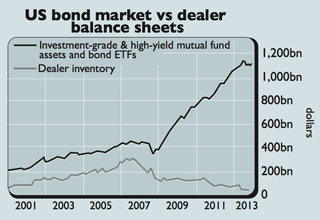Are you prepared for liquidity risk?
It's easy to see how a sell-off in bonds might get out of hand, says Cris Sholto Heaton. Investors should take note.

Get the latest financial news, insights and expert analysis from our award-winning MoneyWeek team, to help you understand what really matters when it comes to your finances.
You are now subscribed
Your newsletter sign-up was successful
Want to add more newsletters?
Earlier this year, the Financial Times reported that the Federal Reserve was considering imposing exit fees on US-based corporate bond funds to reduce the risk of a potential run on these funds. On the face of it, this may not sound like a good idea: after all, there are few things more likely to start a panic than telling people you're going to make it harder to withdraw their money.
But misguided or not, it's a clear sign that regulators are concerned about the mismatch between how easy it is for investors to pull money out of funds and howdifficult it might be for the funds tomeet those redemptions.
This risk exists because most funds allow investors to withdraw their money daily. So a fund that receives a large volume of redemptions may need to sell a significant amount of assets within hours to raise cash.
Try 6 free issues of MoneyWeek today
Get unparalleled financial insight, analysis and expert opinion you can profit from.

Sign up to Money Morning
Don't miss the latest investment and personal finances news, market analysis, plus money-saving tips with our free twice-daily newsletter
Don't miss the latest investment and personal finances news, market analysis, plus money-saving tips with our free twice-daily newsletter
With stocks, that wouldn't usually create many difficulties, except at times of extreme market stress. But most corporate bonds are far less liquid than equities: they change hands in infrequent large block trades arranged through broker-dealers instead of continuous, transparent trading on an exchange.
If investors began pulling large amounts of money from multiple funds, the market might not be able to absorb all the resulting sales in an orderly manner. That could lead to a fire sale by funds desperate for liquidity, leading to a spiral of falling prices and panicked selling.

Meanwhile, a key liquidity buffer has shrunk. Historically, the major bond dealers the trading desks of major investment banks have acted as market makers, meaning that they've been willing to buy when other investors are selling.
But this role involves holding a large stock of bonds, and a combination of lower risk tolerance and tougher regulation in the US has made it less attractive, as their falling bond inventories show.
Factor in the impact of exchange-traded funds, whose need for reliable liquidity could add even more selling pressure in a panic, and it's easy to see how a sell-off might get out of hand. With bond valuations stretched, regulators are right to be worried. Investors should take note.
Get the latest financial news, insights and expert analysis from our award-winning MoneyWeek team, to help you understand what really matters when it comes to your finances.

Cris Sholt Heaton is the contributing editor for MoneyWeek.
He is an investment analyst and writer who has been contributing to MoneyWeek since 2006 and was managing editor of the magazine between 2016 and 2018. He is experienced in covering international investing, believing many investors still focus too much on their home markets and that it pays to take advantage of all the opportunities the world offers.
He often writes about Asian equities, international income and global asset allocation.
-
 Pensioners ‘running down larger pots’ to avoid inheritance tax as rule change looms
Pensioners ‘running down larger pots’ to avoid inheritance tax as rule change loomsChanges to inheritance tax (IHT) rules for unused pension pots from April 2027 could trigger an ‘exodus of large defined contribution pension pots’, as retirees spend their savings rather than leave their loved ones with an IHT bill.
-
 Why do experts think emerging markets will outperform?
Why do experts think emerging markets will outperform?Emerging markets were one of the top-performing themes of 2025, but they could have further to run as global investors diversify